Contractor snags more Lake Las Vegas land in settlement

Las Vegas Paving Corp. has picked up more land at Lake Las Vegas, this time getting property in a court settlement.
The big Southern Nevada contractor and landowner acquired 46.8 acres at the Henderson community last month from the Royal Bank of Canada to resolve a court dispute, property records show.
The site is vacant, hilly terrain off Grand Mediterra Boulevard, south of the luxury community’s 320-acre, man-made lake.
It’s unclear what the company plans to do with that land or the roughly 50 acres it bought at Lake Las Vegas two months ago. No development plans have been filed recently for either site, according to Henderson government spokesman Keith Paul.
But the contractor now owns two empty, once-foreclosed swaths of land in the hills of Lake Las Vegas with histories of financial and legal woes and failed attempts to build homes during the boom years last decade.
Royal Bank of Canada spokesman AJ Goodman said in a statement that the lender is “pleased to have reached a settlement agreement with Las Vegas Paving and wish them well in their future endeavors related to the property. Beyond that we have no further comment.”
Attorneys for Las Vegas Paving could not be reached for comment.
The company owes the bank $1.1 million but has up to two years to pay, according to Las Vegas Valley lawyer Douglas Gerrard, who represented the lender in the case. If no payment comes, he noted, his client can foreclose on the land or sue for the funds.
LAWSUITS PILE UP
The site was supposed to be developed by San Diego-area homebuilder Innovative Communities, which teamed up in 2005 with investment firm Capstone Advisors to build luxury homes at Lake Las Vegas, according to court and state records and published reports.
Royal Bank of Canada, through its then-subsidiary RBC Centura Bank, issued the developers a $30 million construction loan in early 2007, court records show. But with the housing market weakening, the project stalled and lawsuits started flying.
Las Vegas Paving sued the developers and others in spring 2008, alleging it was owed $3.2 million for work at Lake Las Vegas, though one of its targets countersued, alleging Las Vegas Paving had stopped working “without notice.”
RBC sued in 2009, after the market had crashed, arguing its loan had priority over Las Vegas Paving’s lien. The contractor countersued months later.
Then in 2010, an engineering firm alleged in court papers that it was owed more than $333,000 for its work on the project.
No homes were built, and Royal Bank of Canada foreclosed in 2013 on the land it recently transferred to Las Vegas Paving, county records show.
‘FORCED OUT OF BUSINESS’
Attempts to reach or locate Innovative Communities were unsuccessful. In late 2008, CEO Thomas Dobron said the company’s future was “very bleak” and predicted a bankruptcy liquidation. In early 2009, he said that banks were “not working with builders” and that he “was forced out of business,” according to news reports.
Capstone, also based near San Diego, could not be reached for comment.
Las Vegas Paving, founded in 1958, makes asphalt for streets and highways and builds airport runways. As of January, the company and its founder, Bob Mendenhall, also owned more than 3,000 acres of vacant industrial land in Clark County, mostly at the isolated Apex Industrial Park north of Las Vegas.
It bought about 50 acres at Lake Las Vegas in January for $1.5 million. The now-defunct Engle Homes had planned last decade to construct hundreds of homes in that area, but in the end, none was built, companies involved fought in court, a project lender failed, and banking regulators foreclosed on the land that Las Vegas Paving ultimately bought.
Contact Eli Segall at esegall@reviewjournal.com or 702-383-0342. Follow @eli_segall on Twitter.